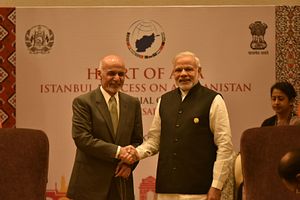As was expected, India once again managed to isolate Pakistan at a multilateral forum. This time the venue was the Heart of Asia (HoA) conference on Afghanistan in Amritsar, India. The two-day conference concluded on Sunday with a strong declaration that called for a concerted regional and international effort to ensure the elimination of terrorism as well as the dismantling of terrorist sanctuaries and safe havens — all this in addition to disrupting all financial, tactical, and logistical support for terror networks.
Without naming Pakistan, the target was clear. The Amritsar declaration said that among terror groups propagating a “high level of violence” were “the Taliban, Daesh (Islamic State) and its affiliates, the Haqqani Network, al-Qaeda … Lashkar-e-Taiba, Jaish-e-Muhammed, Tehreek-e-Taliban Pakistan … and other foreign terrorist fighters.”
India and Afghanistan put up a united front to pile up pressure on Pakistan. Prime Minister Narendra Modi demanded “resolute action” not only against forces of terrorism, but also against “those who support, shelter, train, and finance them,” underlining that terrorism and externally induced instability pose the gravest threat to Afghanistan’s peace, stability and prosperity.
But it was Afghan President Ashraf Ghani, once a seeming ally of Pakistan, who took the battle straight to Pakistan by directly blaming the country for “launching an undeclared war” against his country and demanded an Asian or international regime to verify Pakistan-sponsored terror operations. He also rejected the $500 million offered by Pakistan for Afghanistan’s reconstruction, asking that it would be better off used to check extremism. “This fund, Mr. Aziz, could very well be used to contain extremists because without peace any amount of assistance will not meet the needs of our people,” Ghani said, directly addressing Pakistan’s Foreign Affairs Adviser Sartaj Aziz.
Faced with this onslaught, Aziz had a difficult task in making Pakistan’s case. Asserting that it was “simplistic” to blame one country, Aziz suggested that his attending the meeting despite “escalation” along the Line of Control between India and Pakistan in Kashmir was a testimony to Pakistan’s “unflinching” commitment for lasting peace in Afghanistan. Aziz additionally expressed unhappiness over the cancellation of the South Asian Association for Regional Cooperation (SAARC) Summit in Islamabad in November, terming it as a setback to regional cooperation.
In a sign of a new seriousness in India’s Afghan policy, Modi offered a vision of Afghanistan as a “hub … for strengthening links of connectivity between South Asia and Central Asia,” and called for “an Afghan-led, Afghan-owned, and Afghan-controlled [reconciliation] process.”
The outcomes of this year’s Heart of Asia conference represent another diplomatic setback for Pakistan and it is now apparent that regional states are more united than ever in their drive to marginalize Islamabad. But it remains far from clear if Pakistan will see this as a major constraint on its behavior. After all, it has the backing of China at the moment. The China-Pakistan relationship is blossoming, with China poised to deploy its naval ships along with Pakistan navy to safeguard the strategic Gwadar port and trade routes under the $46 billion China-Pakistan Economic Corridor (CPEC).
What was clear from the Heart of Asia conference, however, was that New Delhi and Kabul are more willing than ever to carve out a partnership to deal with Pakistani intransigence on the issue of regional terror.
































